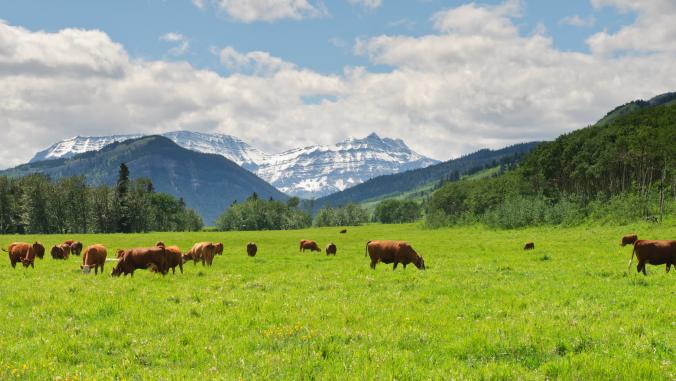Capitalism's change of climate
Capitalism is stepping in, doing what it does best: aligning markets and prices with risks and opportunities associated with climate change.

Reprinted from GreenBuzz, a free weekly newsletter. Subscribe here.
For decades, the main argument against climate action has been economic: Even if the climate is changing, the argument went, addressing it at the scale needed would force companies, cities and institutions into bankruptcy. In short, it would tank the economy.
And for decades, that argument (combined with scientific denial and skepticism) has dominated the case for moving slowly and incrementally — or for doing nothing at all.
That argument is being turned on its head. Today, the fear is that corporate and institutional inaction on climate could lead to a global recession, or worse.
Over the past few months, we’ve been hearing growing voices warn that climate change poses an existential threat to companies and economies, and that those not ready to address that threat in a serious way are flirting with financial disaster.
So, capitalism is beginning to step in, doing what it does best: aligning markets and prices with risks and opportunities — in this case, those associated with climate change.
The financial sector, from banks to insurers, is finding itself on the firing line of this movement. Consider these headlines:
- Companies that fail to respond to the challenges of climate change "will go bankrupt without question," Mark Carney, governor of the Bank of England, said last week. Carney noted that banks and insurance companies are among firms threatened by growing efforts to tackle the climate crisis, which he said would result in "major changes" to the economy. He added: Businesses "will go bankrupt without question" if they fail to respond.
- Insurers have warned that climate change could make coverage for ordinary people unaffordable. Munich Re, the world’s largest reinsurer, blamed the climate crisis for $24 billion of losses in California’s recent wildfires. Ernst Rauch, Munich Re’s chief climatologist, told The Guardian about premium rises already under discussion with clients holding asset concentrations in vulnerable parts of the state. Most of California’s 20 worst forest blazes since the 1930s have occurred since 2000, according to a Munich Re analysis.
- Extreme weather events are becoming more frequent and more costly, according to the U.S. government’s own calculation, and the $5 trillion global insurance industry is at risk. Insurance plays a significant role in the U.S. economy, with insurance spending making up about 11 percent of America’s gross domestic product in 2017.
- Natural disasters caused a record $160 billion in worldwide losses in 2018, with about half paid by insurers, according to Swiss Re. Research from Cambridge University’s ClimateWise initiative predict this trend will accelerate and warns that if climate change is left unchecked, catastrophic losses on property investments from disasters such as wildfires, hurricanes and flooding could triple over the next 30 years, with significant implications for the global economy.
- More than 20 companies, representing 20 percent of the insurance industry’s global assets, have exited the coal business, notably in Europe and Australia, where 22 major insurers have divested from coal and tar sands companies and 13 have stopped or limited underwriting insurance policies for the coal industry. So far, no major U.S. insurance company has pledged to divest its holdings in fossil-fuel companies or to restrict underwriting insurance for fossil-fuel projects.
Much of this is not new. I first wrote about the insurance industry and climate change back in 2005, not long after Hurricane Katrina caused about $60 billion in damage in the southern United States — a single event that eclipsed the $30 billion in hurricane-related insurance losses for the entire previous year. In the subsequent year, 2006, Lloyds of London, the world's oldest, largest and most well-known insurance exchange, issued a report urging insurers "to take climate change seriously or risk being swept away."Much of this is not new. What’s different is that the data is becoming increasingly less hypothetical as the negative impacts of a changing climate are more acutely felt.
So, the recent spate of reports and pronouncements shouldn’t come as much of a surprise. What’s different now, however, is that the data is becoming increasingly less hypothetical as the negative impacts of a changing climate are more acutely felt.
It also comes at a time when institutional investors — endowment funds, commercial banks, mutual funds, hedge funds, pension funds and the like — are increasingly concerned about the security of their investments should climate change begin to roil markets. These institutions also are being asked to disclose more about the environmental, social and governance (ESG) risks their portfolios face as well as their plans to mitigate the risks.
And it’s no longer just so-called socially responsible investors and their funds. The world’s biggest asset managers are homing in on ESG data and, in some cases, building products that tap into investors’ increasing concerns.
Last week, for example, Goldman Sachs launched an internal unit designed to better promote inclusive economic growth and to address climate change. The newly formed Sustainable Finance Group aims to help deliver sustainability and impact investing expertise across a broad range of growth themes. Meanwhile, BlackRock recently introduced three new money-market funds that invest in securities of entities that meet certain ESG criteria.
So, can capitalism solve climate change? Most people are skeptical. After all, the penchant for never-ending growth is partly responsible for what got us here. The clash between ecological limits and society’s desire for more-more-more will forever present a seemingly intractable dynamic.
But if capitalism is to play a positive role going forward, it will need to begin with financial institutions and the markets they serve. And those markets are just starting to wake up to the notion that in a world of accelerating resource constraints and natural disaster disruptions, even the surest investment bet is becoming increasingly risky.





